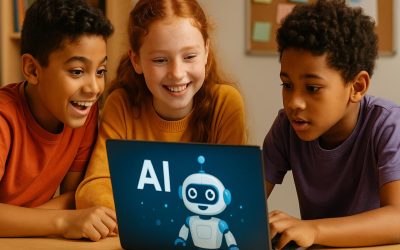Artificial intelligence (AI) is rapidly transforming our world, and its influence is increasingly reaching younger generations. With more than half of youth and young adults already using AI generative tools, it’s clear that AI literacy is becoming an essential skill for the future [1]. This article explores the growing interaction between AI and young people, highlighting the importance of AI literacy, responsible AI use, and how parents and educators can guide the next generation to become AI-competent citizens.
The Rise of AI Use Among Youth
AI tools, from chatbots to image generators, are becoming more accessible and integrated into daily life. A recent Harvard survey found that 51% of young people aged 14 to 22 have already engaged with AI generative tools [1]. This widespread adoption underscores a significant shift in how young people learn, create, and interact with information. As AI continues to evolve, it will play an even larger role in education, careers, and personal development.
The Importance of AI Literacy
AI literacy goes beyond simply knowing how to use AI tools; it involves understanding how AI works, its capabilities, and its limitations. For young people, developing AI literacy means being able to critically evaluate AI-generated content, understand ethical considerations, and recognize potential biases. It also involves learning how to effectively leverage AI for problem-solving, creativity, and innovation. Educational frameworks, such as the AI-Class Framework, are being developed to help safely and effectively integrate AI technology into teaching and student learning [1].
Guiding Responsible AI Use
As with any powerful technology, responsible use of AI is paramount. Parents and educators have a crucial role in guiding young people to use AI ethically and safely. This includes discussions about data privacy, intellectual property, and the potential for misuse. Recommendations for regulating AI to minimize its risks to children and families are also being explored, emphasizing the need for a balanced approach that fosters innovation while protecting young users [1]. By promoting critical thinking and ethical awareness, we can empower youth to navigate the AI landscape responsibly and harness its potential for positive impact.
Q&A
Q: What does AI literacy mean for young people?
A: AI literacy means understanding how AI works, its capabilities, and limitations, as well as being able to critically evaluate AI-generated content and use AI ethically for problem-solving and creativity.
Q: How prevalent is AI use among youth?
A: A Harvard survey indicates that 51% of young people aged 14 to 22 have already used AI generative tools, showing a significant and growing trend.
Q: What is the role of parents and educators in guiding youth with AI?
A: Parents and educators should guide responsible AI use by discussing data privacy, intellectual property, and potential misuse, while also promoting critical thinking and ethical awareness.
Sources
[1] Child Trends. (2024, December 19). 8 Trends to Know About Children and Families for 2025. https://www.childtrends.org/publications/8-trends-children-and-families-2025








0 Comments